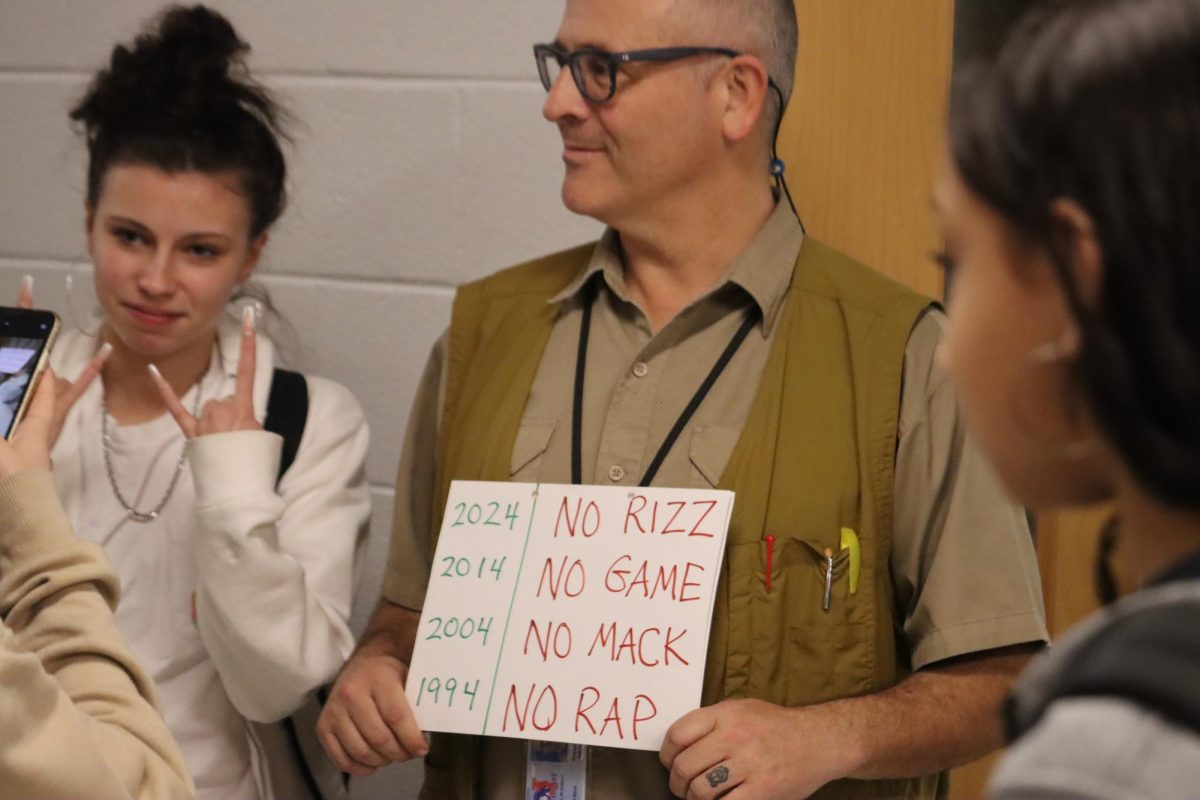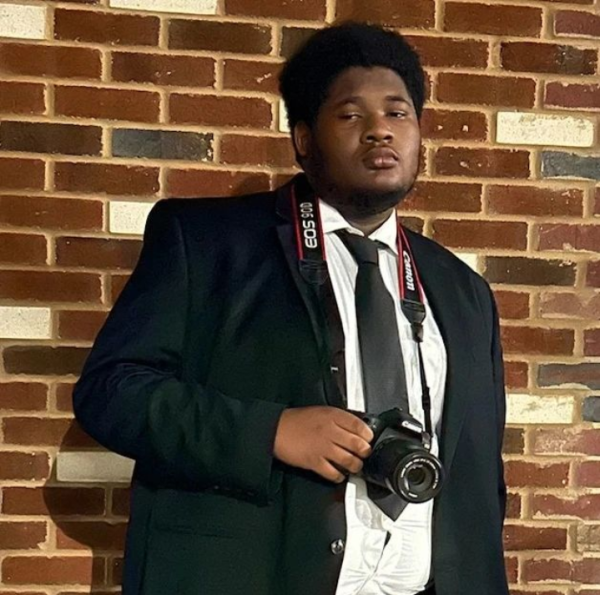Maybe you have seen him in the halls holding signs like, “No Tea Spilling on Fridays,” or, “I Stand on Business,” or even, “No Opps Allowed.”
Maybe you have tried to call out “Black!” or “Red!” when he presents you with a deck of cards, a piece of candy or gum on the line. Maybe you’ve taken Jolly Ranchers or bananas out of his classroom.
Maybe you remember when he randomly shaved his head in the middle of the year.
Whatever the case, it’s hard not to know who Don Byrne is.
While most students can assure you that Byrne is an out of the ordinary teacher, most don’t know how interesting he truly is. Whether it’s the fact that he can speak 5 languages, that he was in a rock band, or that he lived off the grid for 10 years.

The Sahara Desert
Byrne was traveling through the Sahara Desert on a bus not meant for the sand. He and the other 15 ESL teachers (English as a Second Language) were facing the dangerous reality of their faulty transportation.
It was crucial that their bus stuck to certain paths laid out for them or else it was going to get stuck in the sand. When they decided to go off of the trail to look at the ocean… it’s safe to say they soon found themselves immobile.
After about five hours of being stranded and stuck in the hot grainy sand of the Sahara, a military vehicle luckily found the group of teachers. Byrne was unsure what might have happened if the military vehicle had not been passing by.
“You realize how much of life is chancy, and how close death is at all moments,” he said.
The first adventure, of many, starts in the Sahara Desert. With about 15 other ESL teachers, Byrne traveled from London, through Europe, to Africa. In Africa he visited Morocco, Mauritania, Senegal, The Gambia, and even had a layover in Sierra Leone. He took this trip from Decemeber 2003, to January 2004.
His mission from there was to scout out places in Africa where ESL schools could potentially be set up. Throughout this month-long journey Byrne’s favorite place he visited was the Sahara Desert. The three days traveling through the desert had its memorable ups and downs.
“Everything around that was really intense… crossing the Sahara,” Byrne said.
Maybe it was driving through clouds of locust, drinking salty water, eating food with sand in it, or being able to see the brightest stars he had ever seen. The experience and the different aspects of the trip were intense, but Byrne also found them to be beautiful.
The only light during the nighttime besides the stars was the campfire, and that soon died out. Byrne mentioned the constellation Orion and pointed out that he was able to see Orion’s bow. He has never seen stars brighter.
At one point during the trip through the desert, the bus was driving through clouds of insects. These insects were locusts: grasshopper-like bugs found in Africa, Asia, and the Middle East. They were under the wheels and hitting the windows of the bus. The bus drove through millions of locusts while driving through certain parts of the desert. This affected their visibility on the path.
During another portion of the trip they had to cross borders through conflict.
“You see camels out the window walking along and then you look out the other window and see vehicles that had been blown up by landmines,” Byrne said.
To this day, Byrne is not able to donate blood because he traveled through yellow fever zones in The Gambia. After the trip through Africa, Byrne went to Crete, Greece for a month. In Crete he stayed at an ESL training center. During his stay he was able to work on his modern day Greek, and as a language teacher, that was his favorite part of visiting Greece.
Rock and Roll in Atlanta
Byrne left teaching after nine years to focus on starting his own rock band. Byrne lived in Atlanta in the early 2000s, and loved the musical aspect of the city. This led to Byrne pursuing a career in music. He was the bassist in his band, but he also worked as an apprentice recording engineer.
Byrne was in an indie rock band from 2000-2003. His sister was the lead singer, he was the bassist, along with two others who played the guitar and drums. These four made up an original band: Shamgod.
While in his band, there were two big hurdles he had to overcome. The first challenge he faced was recording original music and giving it to club owners, hoping for live shows. That next hurdle was getting to play live for an audience or otherwise known as ‘playing out’ in the music industry. They wrote music and played it live in the rock and roll clubs in Atlanta.
As Shamgod started to get over these hurdles, they faced more problems.
After starting to talk to record distribution labels things seemed to be looking up for Shamgod. And then… they weren’t. It was mostly for personality clashes, but the band was not working anymore.
“It’s harder than you think to keep a band together,” he said.
After being together for three years, Shamgod broke up. They played their last gig together and they filled the club with 200 or 300 people.
But Byrne decided it was time to take his next big step in life. He wanted to pursue being an ESL teacher.
“I sold everything. All I had,” Byrne said.
Byrne was down to a single backpack. His only other possession being a bicycle. He told a homeless man that there would soon be a free bicycle at the train station. Byrne was then left with just a backpack full of his belongings and a fierce determination.
“I follow the path as far as it leads,” Byrne said.
Living Off the Grid
After the birth of Byrne’s son, he invited a group of people to have a naming ceremony out in his pasture. Ahead of time, about fifty people had been allowed to suggest names. Byrne and his wife did not tell anybody what their son’s name was for the first few weeks after he was born. They revealed their son’s name in the pasture that day. As it turned out, Byrne and his wife had taken a suggestion from a close family friend, for both the first and middle name.
“It was wonderful to have everyone there walk back into the woods from the pasture, and there was a little baptism ceremony that happened in a little creek,” he said. Traditionally, baptisms are done in a church. But his son’s baptism was done on Byrne’s own land.
Byrne, along with his father, Donald Byrne Sr., moved to a 32 acre plot of land in North Carolina in 2006. For years they lived off the land and made a home for themselves. What prompted this major change of living was a simple goal. Byrne wanted to reduce his carbon footprint. And he worked at that every day, in everything he did, from the farmhouse chores to learning how to conserve water.
He would try to actively use less electricity and less water. He only wanted to buy what he could not make or grow from the land. He tried to drive less and use as little energy as possible.
Byrne’s lifestyle was embodied by three words: Simplicity, hospitality, and self efficiency.
He was inspired by a monk named Thomas Merton. Thomas Merton was an influential Catholic author of the 20th century. He wrote numerous works about spirituality, activism, lifestyle, nonviolence, and the nuclear arms race.
Byrne and his family lived in a small series of cabins for years on his plot of land. There were huge gardens, endless woodlands, and numerous animals. It was a lot of work, but he found it all quite rewarding. Like chopping wood so that his family would be warm during the winter, or trying to figure out how to cultivate more food from just the land. It all went towards his dream, and therefore, it was rewarding.
“He is very passionate about it,” said Byrne’s coworker Brandon Harrison, a fellow teacher at RNE. Harrison, who Byrne has talked to about his goals and his plans, admired his passion.
There were a lot of setbacks in everyday life on the farmstead. Like protecting the animals from predators or withstaining from sugar cravings. Talk about the epitome of, ‘We have food at home.’
Funnily enough, Byrne loved these challenges and getting through them. He liked to use creativity to solve a problem and see the immediate result.
Living on the farmstead taught Byrne a lot of things. His favorite one to bring up is being able to stack hay for the animals. Not many people know how to do that, but he, proudly, does.
One memory that has continued to stick with Byrne from his time in North Carolina took place during a day in the deep winter. As Byrne went to check on the sheep he found something terrible. A mother sheep tangled up in the electrical fence. The sheep had been pregnant with twins. She sadly died before he found her.
So, Byrne called his kids to help dig a grave for her. It was February, the ground was hard, it was cold, and still, they dug her grave together.
Once they were done, the trio stood on the edge of the hole and helped put the sheep into her newly dug grave. To Byrne it was important that his children were able to see the cycle of life and death.
“They helped me put that poor creature into the hole and just be a witness. A witness that she was a beautiful animal, and that she was helping us in our beautiful dream of sufficiency and running a farmstead. And that death can interrupt all of that at any moment,” Byrne said.
To Byrne’s displeasure, following the path of living off the grid only went on for 10 years. Byrne’s father, Byrne Sr., fell ill. And after a while, with an unwanted nudge from the American health system, Byrne Sr. became aware that he needed to sell the land. It was the only way to pay for the expenses.
So, Byrne said goodbye to his homestead in 2017 and moved out of the states to Costa Rica.
The Coffin Maker
Making a coffin for someone still living is entirely different than making a coffin for someone who has passed.
A WWII veteran reached out to Byrne wanting a coffin to be made for himself. The veteran cut down his own tree and requested that Byrne make a coffin out of that wood. Normally Byrne made the coffins out of pine, but he took on the challenge. The veteran died a few years later.
While living off the grid in North Carolina, Byrne started a business making coffins. It was called, ‘Piedmont Pine Coffins,’ he started his business so that families could have handmade coffins. They were cheaper than factory made coffins, while also helping to add a sentimental and more personal touch to the grieving process. He taught himself how to make the coffins and steadily got better at it.
Byrne started his business in 2013 and it ended in 2017 once he had to sell the land. He enjoyed making the coffins and it was something he was evidently passionate about. He worked on his craft and got farther than he thought possible.
“It’s amazing how quickly you get better,” Byrne said.
Though the business never really took off, Byrne appreciated being able to contribute something special to the grieving families.
He even went to some of the funerals that he crafted coffins for. Byrne would sit in church, surrounded by a room of strangers, the only thing familiar to him being the coffin he crafted, and he would learn about the recently deceased.
“You feel a universal wave of empathy,” he said.
Byrne made a final coffin, originally designated for himself, which he burned and used to build a bonfire as a goodbye to his farm. Before the coffin was burned he and his family put memorable things inside. As they burned the coffin, they made a ceremony of it through both speeches and tears.
Though Byrne was passionate about making coffins, and passionate about helping families have a less artificial burial, he had to leave it all behind. One of the ways he was able to fund moving to Costa Rica was selling all of his tools. He lived there for three years with his wife and kids. They lived on the farm of Byrne’s uncle-in-law.
The death of one adventure would feed the birth of a new one.
LA Times, Pine maker believes in a more grounded kind of burial
Living in a Tent
“It’s a very nice tent… but it’s still a tent,” Byrne said.
Byrne ended up living in his tent out of convenience. Though he much prefers it to the previous year, when he lived in a house in Sumpter. Yes, that’s right, a tent.
Byrne might be the only employee in the school district to live in a tent. Most people might think of a camping tent, but Byrne likes to refer to his as more of a circus tent. The tent is 20 feet of open space on a property of eight acres that he calls home.
Though Byrne lived in Costa Rica for three years before coming back to the states, one of his goals did not change. To lessen the carbon he used. One of the ways he works towards this goal in his daily life is his current living situation.
For someone like Byrne, it’s easier to breathe when you’re surrounded by the natural world. He lives there with his two kids. His wife travels between the plot of land and Sumpter.
Living in a tent is not someone’s first option of living, it might not even make the top 10, but Byrne wished to lessen the carbon emission from constantly traveling in his car. Not only did he have to drive to work, but he needed to take his kids to their own school. Living on his land, even if it’s in a tent, was the solution.

The Monastery
Before Byrne went into his rock and roll career, he went on a slightly different path. One that involved silent nights, praying seven times a day, and singing Psalms.
He tested out this lifestyle for six weeks in 1997.
Byrne was training to become a monk.
In Mepkin, South Carolina, Byrne lived in the Mepkin Abbey Monastery. Mepkin Abbey is a Trappist Monastery. Trappist monks and Trappistine nuns are named after La Trappe Abbey, the monastery in which the religious order originated. Trappists and Trappistines closely follow the Rule of Saint Benedict. This rule organizes the monastic day into sections of prayer (both private and public), spiritual reading, sleep, and manual labor.
Byrne respected and learned a lot about Thomas Merton, who was a trappist monk. And though Byrne was inspired by the thought of a monastic lifestyle throughout his life, he only went to a monastery when he was in his early thirties.
Soon he dove into a completely different world. A world where there was a grand silence from 6 pm to 10 am. A world where there was no pressure of taxes or outside costs. A world where getting closer to the divine was your entire life.
Byrne had long looked for a single sail to put all of his wind, or dreams, behind without any distractions. He wished to put all of his energy and passions into one single goal in life. In the Mepkin Abbey Monastery he found a space to do just that. He was able to focus his energy and bring his goals to the forefront of his life.
As an introvert he enjoyed the quieter life. He would wake up and go through chicken coops for a few hours simply getting the eggs during the grand silence. The monastery had roughly 30,000 chickens. He enjoyed the gentle clucking and the steady work, though he didn’t care much for the smell. With the routine silence, prayer, and thoughtfulness, his senses felt heightened. It was both relaxed and intense.
“It’s so intense because other distractions of daily life are far away and you slow down,“ Byrne said.
After the calm morning hours he would sing and chant Christian psalms with his fellow monks.
During a day at the monastery, the monks and the nuns would routinely pray seven times. Some of those prayers would take place in the middle of the night including 12am and 2:30am. Despite this, Byrne was getting so much sleep that he would end up having vivid dreams. This led him to keep a dream journal during his stay at Mepkin Abbey. It ended up being Byrne’s only record of his time there.
At the monastery, Byrne met all sorts of different people. The common stereotypes of monks seemed to reign true. The younger monks were excited to be there and learn. The middle aged monks seemed miserable. They needed to get over certain hurdles to become closer to the divine.
This included ego.
“Your ego is a lump of coal that finally breaks and you get a diamond,” Byrne said.
And once these monks hit diamond, they fit in with the older monks. The older monks were selfless and kind. They always thought about how to help others, their own self normally forgotten in the process. Their ego was nowhere in sight. The diamond they hit was peace and happiness.
Byrne mentioned that he has never met anyone that mimicked the selflessness and overall peaceful personality of the older monks. They seemed to have reached their goal, being as close as possible to the divine.
“They were a very rare type of people,” Byrne said.
As he spent more and more weeks at the monastery, Byrne felt increasingly uncomfortable with the language of the Psalms they chanted. Some of the messages did not set well with his own personal respect for other religions.
Byrne said.
And then one night, Byrne had a dream.
He was drowning. And when someone finally saved him, he got the answer he was looking for. Byrne described his savior as a master of the Buddhist religion. To him this dream had a pretty clear message. It supported his growing idea that he was not meant to be at the monastery. He soon decided he would leave.
While he tried out this lifestyle for six weeks, he never took any vows.
“It was an awesome experience, but it was not for me,“ Byrne said.
Teaching
Through all of Byrne’s adventures there have been two constants, learning and teaching. He has taught off and on for 19 years.
“He is willing, always willing to share information. Which is cool because not everybody wants to share information,” said Harrison.
When asked if he had any souvenirs from all of the places he’s been, he paused to think for a long time. Eventually Byrne came to the conclusion that he had collected souvenirs from all of his adventures, and had hid them in his classroom. Byrne had them weaved through his lessons, they were camouflaged in his compassion, and sparkling through the fun he brings to his class.
All of Byrne’s students know the song “Time to Shine,” by Evelle. It plays almost every class during the start of class or throughout break periods. For students who have had him for more than a year, overplayed is an understatement. Though, Byrne never seems to tire of it. He found the song in 2018 and has continued to play it since. He is fond of the message and the motto it gives to students. His favorite lyric is, “The stars will align.”
Outside of latin, Byrne also hopes to teach his students life lessons. That might be through breathing exercises, or reminding his students with an analogy about life. Everyone has a cup that is a different size, and everyone’s cup can only hold so much before it overflows. He reminds his students that you never know who’s cup might be threatening to overflow.
“I think he’s a very very authentic person,” Harrison said.
Dreams Deferred
Byrne has lived through and pursued many dreams in his lifetime, but what about the dreams deferred?
Byrne continues to follow any paths he might find himself passionate enough to go on. He follows his dreams in his everyday life.
“I can say I’m still searching for that one umbrella, that one sail,” Byrne said.
The idea of putting all of his energy towards one thing in life really appeals to him.
What would happen if his energy was not split between multiple areas in his life? And through his experience of living his dreams, he has a great understanding of what it is like to lose touch with them.
Byrne often refers back to a poem called “Harlem” by Langston Hughes when reflecting on his life.
“Of course it’s frustrating to have a life’s dream suddenly terminated. What a shock. So now what do you do with those hopes and dreams? It’s a dream deferred, like the poem,”
Following Byrne’s dreams and stories there is a clear answer. Hopes and dreams are not lost, they are misplaced until found again.
“It’s like a wave going through my life. Every five years it’ll come and urge me to focus my energy towards one thing. And who knows, I’ve been in South Carolina for five years.”












Sherry Ojeda • May 28, 2024 at 11:01 AM
Great job Tinnin! It was great reading about Mr Bryne after being able to meet him and have some mini conversations with him. I like at the end about a dream deferred. Dreams are not lost or unachieveable, just deferred until later.
Gwendolyn Clarke • May 28, 2024 at 9:56 AM
Wow! Such a beautiful life shared with a talented student. Keep up the great work, and I hope Don continues to make a difference.
Maddie Stallworth • May 18, 2024 at 12:03 AM
Tinin this was written really well I loved learning more about Mr.Bryne’s life. I think we can all agree that he is an inspirational icon.
Samuel Vargas • May 17, 2024 at 2:53 PM
Tinnin, what a extravagant piece of writing, I am proud of how much you have improved on your writing, I believe if you continue writing, you will be the best writer in no time, except you forgot a comma in paragraph 6, kidding kidding, but good job, you have made me proud and hi tinnin mom, im her friendd, nice to meet you and hi tinnin dad, I think you might of saw me before, and hi to baye too, but your daughter has done an amazing writing since I met her, proud of her,and proud of baye’s writing too, proud of both of them and they will keep on improving, that is all.